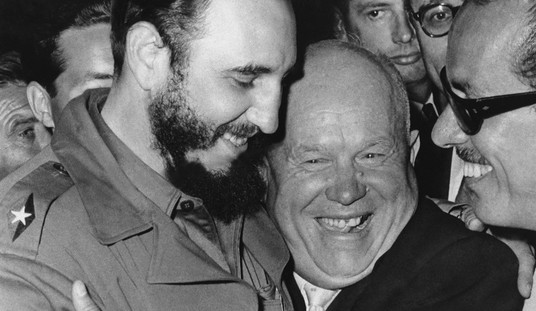And people wonder why multilateral organizations suffer from such poor reputations as mouthpieces for dictators and kleptocrats. The World Health Organization routinely selects celebrities and other well-known people to serve as “ambassadors” for the advancement of health and human rights. This week, WHO chose a well-known individual for that honor — one well known to other health-care organizations and human-rights activists, as well as the US State Department.
And, er … not in a good way:
“The decision to appoint Robert Mugabe as a WHO goodwill ambassador is deeply disappointing and wrong,” said Dr Jeremy Farrar, director of the Wellcome Trust, a major British charitable foundation. “Robert Mugabe fails in every way to represent the values WHO should stand for.”
Ireland’s health minister, Simon Harris, called the appointment “offensive, bizarre.”
”Not the Onion,” tweeted the head of Human Rights Watch, Kenneth Roth, in a reference to the satirical news site.
Mugabe has held a death-grip on Zimbabwe for decades, transforming it from Africa’s breadbasket to a nation that cannot feed itself. He has brutally dealt with political rivals and suppressed dissent. Under his tender care, the Zimbabwean economy routinely ran inflation rates in triple digits, and the currency had to be issued in denominations of billions. As NBC News notes, the health care situation under his despotic rule of almost 40 years has gotten so bad that Mugabe seeks care outside the country rather than use his own system. The State Department has sanctioned Mugabe for the last 14 years for corruption and human-rights abuses.
However, WHO director-general Tedros Ghebreyesus insists that Mugabe’s just the right man to exercise influence in the region for better health care:
Tedros, who this year became WHO’s first African director-general, said Mugabe could use the role “to influence his peers in his region” on the issue. He described Zimbabwe as “a country that places universal health coverage and health promotion at the center of its policies.” A WHO spokeswoman confirmed the comments to The Associated Press.
Don’t tell that to Physicians for Human Rights, which did an in-depth “emergency report” on Zimbabwe in 2009. The title alone is damning — “Health in Ruins: A Man-Made Disaster in Zimbabwe” — but the report gets a lot more specific, and points the finger at one man in its preface:
What happens when a government presides over the dramatic reversal of its population’s access to food, clean water, basic sanitation, and healthcare? When government policies lead directly to the shuttering of hospitals and clinics, the closing of its medical school, and the beatings of health workers, are we to consider the attendant deaths and injuries as any different from those resulting from a massacre of similar proportions?
Physicians for Human Rights (PHR) witnesses the utter collapse of Zimbabwe’s health system, once a model in southern Africa. These shocking findings should compel the international community to respond as it should to other human rights emergencies. PHR rightly calls into question the legitimacy of a regime that, in the report’s words, has abrogated the most basic state functions in protecting the health of the population. As the report documents, the Mugabe regime has used any means at its disposal, including politicizing the health sector, to maintain its hold on power. Instead of fulfilling its obligation to progressively realize the right to health for the people of Zimbabwe, the Government has taken the country backwards, which has enabled the destruction of health, water, and sanitation – all with fatal consequences.
The report has one key recommendation that stands out:
The government of Zimbabwe should yield control of its health services, water supply, sanitation, disease surveillance, Ministry of Health operations, and other public health functions to a United Nations-designated agency or consortium. Such a mechanism would be equivalent to putting the health system into a receivership pursuant to the existence of a circumstance that meets the criteria for the Responsibility to Protect. If the government of Zimbabwe refuses to yield such control, the U.N. Security Council, acting pursuant to its authority under Article 39 of the Charter, should enact a resolution compelling the Government of Zimbabwe to do so.
Now, which organization would have the competence to act in “receivership”? Normally that would be WHO, which just honored the man responsible for the collapse of Zimbabwe’s health care system. So much for that idea, eh?
This is not the act of a non-political organization. This is a deliberate attempt to give Mugabe political cover at home and to undermine the popular opposition to his regime. Decisions like these, which favor the corrupt and the injust, affirm the wisdom of those already skeptical of multilateral organizations. If WHO really was focused on improving health, they would be calling for Mugabe’s arrest, not naming him as their “ambassador.” This disgusting choice smells like crony politics or worse, and completely undermines the legitimacy of WHO as a non-political organization.









Join the conversation as a VIP Member